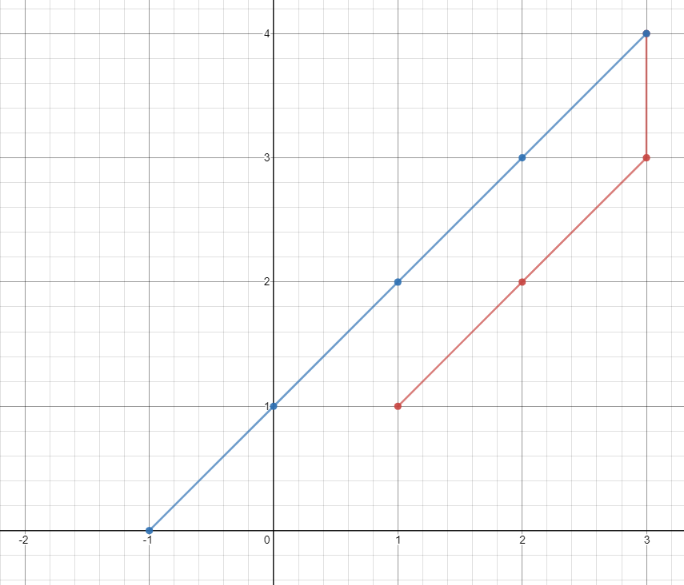On a 2D plane, there are n points with integer coordinates points[i] = [xi, yi]. Return the minimum time in seconds to visit all the points in the order given by points.
You can move according to these rules:
- In
1second, you can either:- move vertically by one unit,
- move horizontally by one unit, or
- move diagonally
sqrt(2)units (in other words, move one unit vertically then one unit horizontally in1second).
- You have to visit the points in the same order as they appear in the array.
- You are allowed to pass through points that appear later in the order, but these do not count as visits.
Example 1:
Input: points = [[1,1],[3,4],[-1,0]] Output: 7 Explanation: One optimal path is [1,1] -> [2,2] -> [3,3] -> [3,4] -> [2,3] -> [1,2] -> [0,1] -> [-1,0] Time from [1,1] to [3,4] = 3 seconds Time from [3,4] to [-1,0] = 4 seconds Total time = 7 seconds
Example 2:
Input: points = [[3,2],[-2,2]] Output: 5
Constraints:
points.length == n1 <= n <= 100points[i].length == 2-1000 <= points[i][0], points[i][1] <= 1000
class Solution:
def minTimeToVisitAllPoints(self, points: List[List[int]]) -> int:
res = 0
x0, y0 = points[0][0], points[0][1]
for x1, y1 in points[1:]:
res += max(abs(x0 - x1), abs(y0 - y1))
x0, y0 = x1, y1
return resclass Solution {
public int minTimeToVisitAllPoints(int[][] points) {
int res = 0;
for (int i = 1; i < points.length; ++i) {
int x0 = points[i - 1][0], y0 = points[i - 1][1];
int x1 = points[i][0], y1 = points[i][1];
res += Math.max(Math.abs(x0 - x1), Math.abs(y0 - y1));
}
return res;
}
}function minTimeToVisitAllPoints(points: number[][]): number {
let ans = 0;
for (let i = 1; i < points.length; i++) {
let dx = Math.abs(points[i][0] - points[i - 1][0]),
dy = Math.abs(points[i][1] - points[i - 1][1]);
ans += Math.max(dx, dy);
}
return ans;
}class Solution {
public:
int minTimeToVisitAllPoints(vector<vector<int>>& points) {
int res = 0;
for (int i = 1; i < points.size(); ++i) {
int x0 = points[i - 1][0], y0 = points[i - 1][1];
int x1 = points[i][0], y1 = points[i][1];
res += max(abs(x0 - x1), abs(y0 - y1));
}
return res;
}
};func minTimeToVisitAllPoints(points [][]int) int {
res := 0
for i := 1; i < len(points); i++ {
x0, y0 := points[i-1][0], points[i-1][1]
x1, y1 := points[i][0], points[i][1]
res += max(abs(x0-x1), abs(y0-y1))
}
return res
}
func max(a, b int) int {
if a > b {
return a
}
return b
}
func abs(a int) int {
if a > 0 {
return a
}
return -a
}
